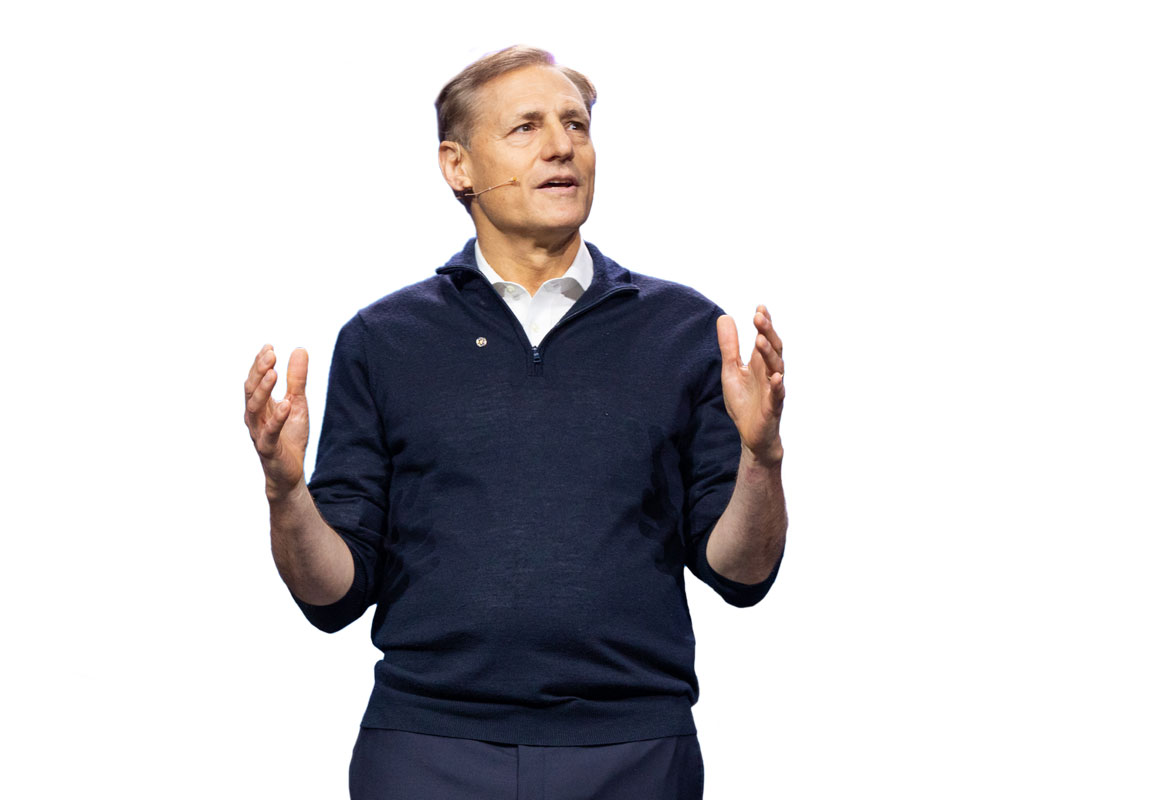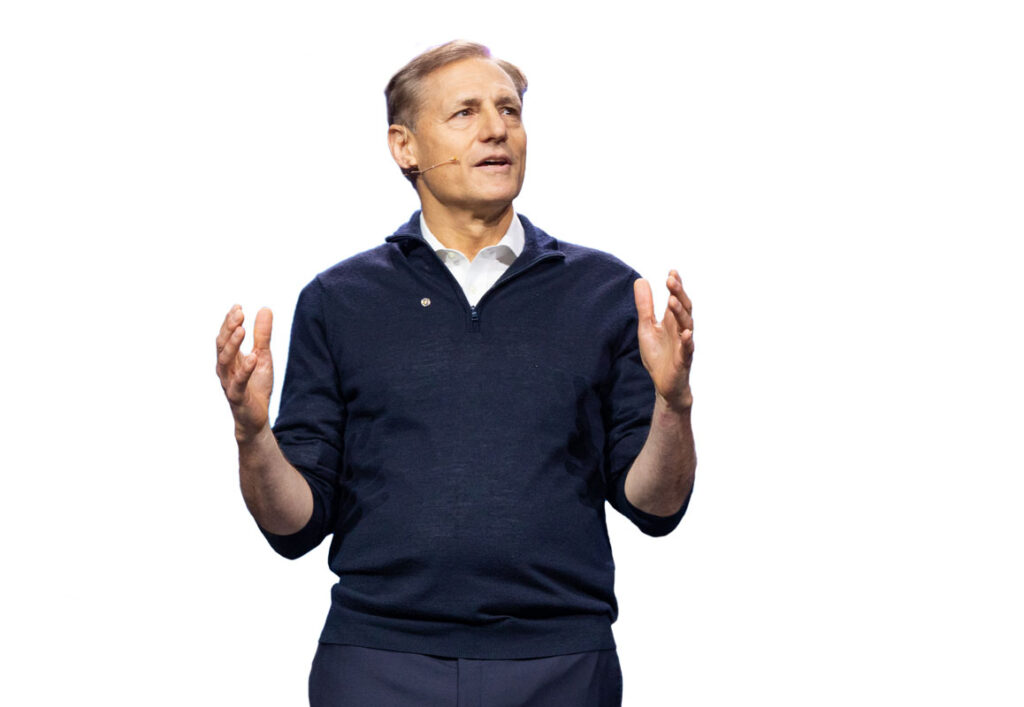
One of Rotary’s vital focus areas — peacebuilding and conflict resolution — came into sharp focus at the Houston convention, in the background of the war raging in Ukraine. RI general secretary and CEO John Hewko’s address to the 11,000-plus participants on how Rotary had helped the oppressed Ukrainians under siege, gained even more poignancy as his parents originally hailed from Ukraine.
He said he was happy at the kind of help the people of Ukraine had got from across the world, especially the young. The Fortnite (an online video game) players decided to support Ukraine refugees by donating funds. “Based on their normal sales (of their video games) they expected to raise somewhere between $15 to 20 million. The average age of a Fortnite player is 19; these players blew those projected numbers out of the water and ended up donating $155 million to the Ukraine relief efforts. That is an astonishing number and it all came from young people wanting to belong to just more than a video game community. They wanted to show they cared about something that is happening right now, something important and wanted to make a difference.”
This is exactly what Rotary and Rotarians plan and do, said Hewko. “When we were formulating our new Rotary Action Plan a few years ago, our research consistently found that young people are hungry for just these kind of engaging, meaningful connections. It also found that all generations want to connect and belong and take action that makes a meaningful difference in the lives of others. That’s why our vision statement says that together we see a world where people unite and take action to create lasting change across the globe, in our communities and in ourselves.”
Rotary does this “by taking action and through meaningful personal engagement, which improves personal wellbeing much more than getting financial rewards. Doing good makes people feel good and also improves physical health.” Of course, the members also have to feel that the club they belong to is relevant and fun. “For the first time in seven years, Rotary will gain net members; this is good news but it is up to us now to keep these new members,” he said.
A Houston club’s transformation
When it came to “grow Rotary”, clubs could take a leaf out of the book of a club in Houston — the Plano West Rotary Club. Three years ago, the club had just 20 members who certainly did not represent the community they served. Their median age was 67 and it had only 5 women and one person of colour. “It hadn’t really positioned itself as a resource for community action. So the club members adapted and changed their approach. They started with activities such as distributing after-school meals to school children, forming close ties with teachers. They reached out to police officers and when the pandemic began, they handed out material about Covid-19 in underserved communities.”
Next, the members started delivering meals directly to the families in need during the pandemic in Afro-American and Latino neighbourhoods. “Because of this effort, people from across the community started showing up to help. The club started drawing members from the Afro-American, Latino and LGBTQ groups, and it also became younger. “Today it has tripled its size to 65 members, including 37 women and 28 men, and its median age has come down from 67 to 50,” Hewko said to thunderous applause.
When clubs grow, they have the power to transform communities and the good their members do, does not go unnoticed, he added.
Helping Ukraine
Right now, Rotary’s commitment to “take action” was amply evident from the work the Rotary family including Rotaractors were doing on the ground in Ukraine. Giving details, he said when “this brutal war began, we moved quickly to designate our Rotary’s Disaster Response Fund as a vehicle for direct Ukraine donations. Thanks to the generosity of donors around the world, Rotary was able to contribute more than $15 million to provide Ukrainians with water, food, shelter, medicine and clothing.”
But that was only part of the story. Many organisations across the world had, and were, raising money for Ukraine. But we are unique.” Ukraine has 62 Rotary clubs and six satellite clubs with a total membership of 1,100. And 24 Rotaract clubs with over 300 members. Through connections with the Rotary family in Ukraine, RI was able to “respond to their immediate needs, whether it was providing meals or medical supplies and even delivering a fire engine and emergency medical vehicle. We listen and we respond. Rotarians and Rotaractors in Ukraine, and every Rotary member supporting them, are extraordinary.”
He then pointed to the delegation of Rotary members from Ukraine who had made it to Houston for the convention even though there were no flights out of Ukraine due to the war. As they waved the Ukraine flag, they were lustily cheered by the Rotarians in the auditorium. Striking an emotional note, the general secretary said: “In the 1940s, my parents fled the country as the Soviet army advanced towards Ukraine, and landed in a displaced persons camp in southern Germany and then began a new life in the US. And here they found a vehicle to give back to the country that welcomed them with open arms when my dad joined the Rotary Club of Clarkston in Michigan.”
He himself had “worked in Ukraine in the early days of Independence in the 1990s, and many of my relatives, friends and former colleagues still live there.” Watching Rotarians do so much for the displaced and oppressed people of Ukraine left him “overwhelmed with gratitude”. Medical supplies had been given by Rotary to multiple hospitals, and Rotarians in “Poland, Hungary,
Slovakia, Moldova, Romania, the Baltic states, and many other countries have opened their arms to millions of refugees, mostly women and children. Some members have travelled to border countries to help refugees adapt to local situations, unload relief material, and deliver it,” he added.
If proof was required that such response to suffering in a war zone matters, “consider this,” said Hewko. “Rotary membership has actually increased in Ukraine since the war began. These are people fighting for their lives, witnessing entire cities being completely destroyed before their very eyes. People who have never touched a weapon are being asked to defend their country. And in the midst of all this, Ukaranians, having seen what Rotary has done in their time of need, have taken the extraordinary step to join our organisation.”
He concluded his speech saying that extraordinary acts of kindness, such as the Fortnite players donating their allowance, Rotarians and Rotaractors still holding meetings and reaching out, “gives me, and I hope each one of you, great optimism for our great organisation and our future. Because if we can grow our impact, we can grow our organisation and the good that we do. If we have the courage to stand up to what we know is right we can bring the world a little closer to peace.”
Following Hewko’s remarks, Myroslav Gavryliv, a member of the Rotary Club of Lviv, Ukraine, spoke about how clubs in his country had networked to coordinate the distribution of incoming relief supplies and how members are assisting their neighbours.
ShelterBox CEO Sanj Srikanthan discussed how Rotary and ShelterBox, which are partners in providing disaster relief, work together in responding to crises of all kinds. Azim Khamisa, an author and activist, spoke about founding the Tariq Khamisa Foundation after his son was killed by a gang member in 1995 while delivering pizzas. The foundation is driven by the principles of restorative and social justice to help people choose forgiveness and compassion rather than revenge and bitterness.
The Rotary Presidential Conference on Peace, held two days before the opening of the convention, began with recognition of Rotary’s support for peace in Ukraine and talked about the effect that Rotary’s vast network has had in providing rapid humanitarian relief in the country.
The speakers included Dr Gary Slutkin, founder of Cure Violence Global; Julia Roig, founder of The Horizons Project; and Kiran Singh Sirah, a past Rotary Peace Fellow and president of the International Storytelling Centre. At the closing session of the peace conference, RIPE Jennifer Jones joined the chief executive of UNICEF USA, Michael Nyenhuis, in announcing a partnership to empower girls.







